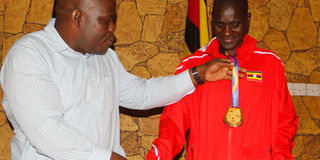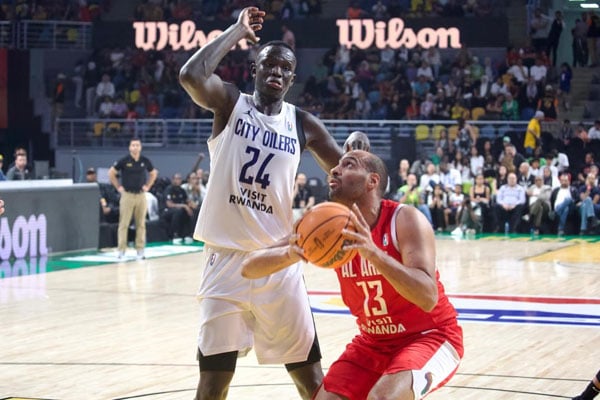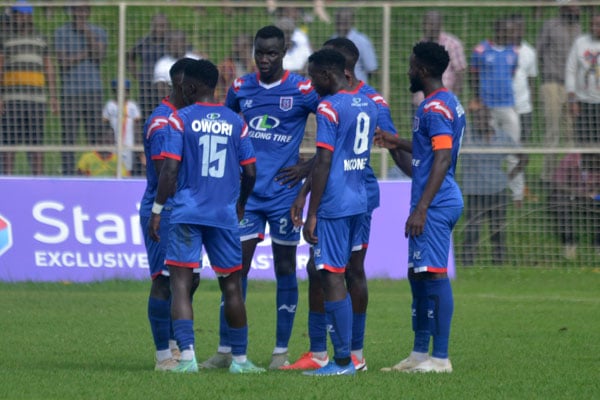Mpindi appeals to IPC to reduce on Para-Athletics Championship costs

Mpindi Bumali (L) gets a feel of Emong's medal at a special breakfast for the World Champion at Hotel Africana. Photo by Ismail Kezaala
KAMPALA. Uganda won the first (gold) medal at the World Para Athletics Championship thanks to David Emong’s victory in the 1500m T46 race in London.
Emong celebrated the historic achievement with another 400m trot on the Olympic Stadium track while hoisting his national flag. Doubtless, his first international gold—after finally beating his Algerian arch-rival and multiple world champion Samir Nouioua after four futile attempts—was a great success.
Out of 66 countries, Uganda finished 43rd. (6th in Africa).Good position. After all, we are above France whose four silver medals and four bronze medals put them in 44th.
Back home, Emong—always a lone ranger with a silver bullet—smells the aroma of his success: finally, a State House visit, cash prizes and more grand promises. But there are questions on the might-have-been.
The London event ended Sunday (July 23) but Uganda’s participation lasted as long as Emong’s 3:58:36-minute-run. Why? The Rio 2016 Paralympic silver medallist was Uganda’s only representative in London like he was in Lyon 2013. Why again?
Most reasons evolve around poor facilitation and Uganda Paralympic Committee President Mpindi Bumali thinks the International Paralympic Committee can greatly help poor African countries by reducing on its pre-event financial requirements.
Mpindi has always labelled the World Championship as “very expensive.” He said an athlete had to pay €880 (Shs3.7m) for the participation fee, £780 (Shs3.65m) for accommodation, then almost $1,500 (Shs5.4m) for the air ticket, which explains why Christine Akullo, Sam Mubajje and Al-Bashir Bwaga, who had qualified, were dropped.
"If the IPC aim at developing sports through inclusive participation, then they should have an alternative for poor African countries like Uganda," said Mpindi, also a member of the African Paralympic Committee.
Of 87 countries only nine represented Africa.
Mpindi argues that charging poor African athletes the same rate of participation fees like the Americans is not fair at all. “Our athletes already go through a lot to qualify under our poor financial conditions, then charging them as much as the Americans or Europeans will definitely keep them out.”
He suggests that the African countries like Uganda be exempted from this fee or pay 40 percent.
A week to the event, Daily Monitor wrote to the IPC, inquiring about the truth in Mpindi’s claims especially on “participation fee.”
We found it odd that disability athletes—already a disadvantaged lot—face such restrictive costs in this era of loud calls for an inclusive global sporting environment.
The IPC has not responded to our mail. But Daniel Etchells of insidethegames.biz also interviewed Mpindi in London and found his claims valid. Etchells quoted the IPC’s response: "We fully appreciate the financial challenges many countries face.
"This is why we are currently reviewing the delivery model of the Championships with an aim to increase the financial investment in all areas.
"By increasing the investment in events, we will ultimately be able to reduce the costs to our membership.
"Through the Agitos Foundation, the IPC’s development arm, we are also working to improve the organisational capacity of developing countries.
"By doing this we aim to better their own fundraising efforts through marketing activities and stakeholder relations.
"Currently Para-sport is not in a position to deliver world class events solely through commercial and broadcast revenue.
"Around 80 per cent of the monies generated via competition fees go directly into covering an Organising Committee’s costs, with the remainder providing support to the International Federation to cover its administration and development activities.
"It must be highlighted as well that the fee for World Para Athletics competition has not changed over the last eight years.
"During this same period of time the level of services provided to athletes and the delivery of the Championships have increased dramatically, as highlighted here at London 2017."




